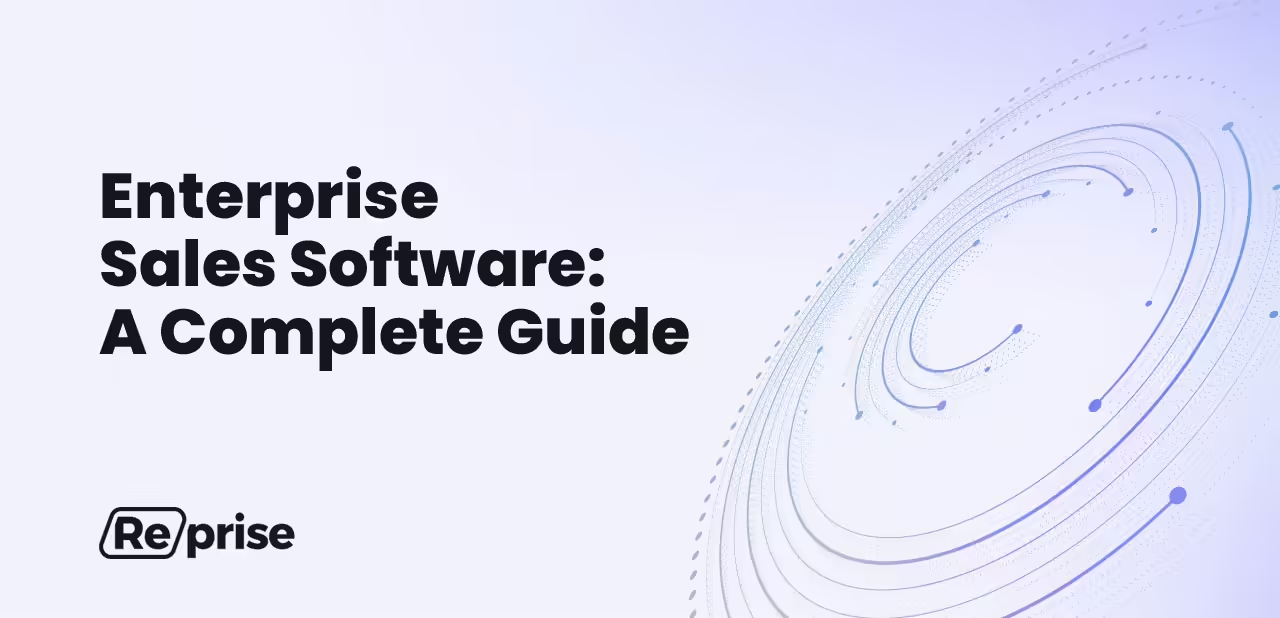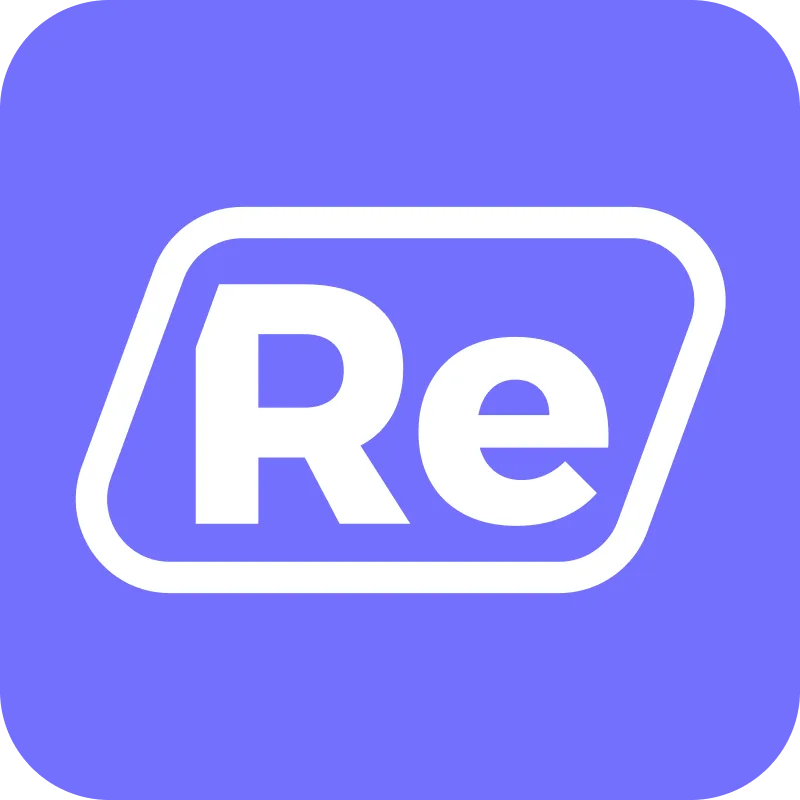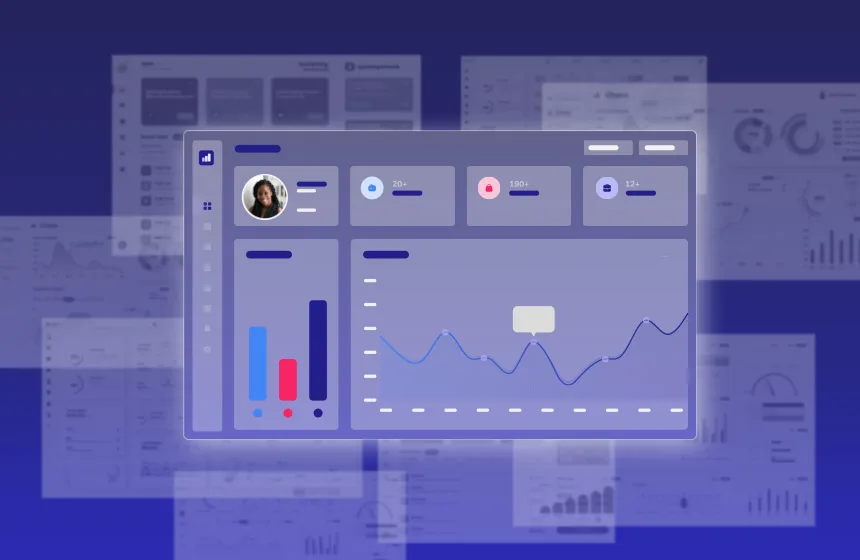Accelerate deals and increase win rates with the leading enterprise AI demo platform.
Enterprise Sales Software: A Complete Guide

April 23, 2025
Table of Contents
What is Enterprise Sales Software?
Enterprise sales software refers to the tools that are designed to support and streamline the sales processes of large organizations. These tools integrate various functionalities to manage customer relationships, sales activities, and analytics, ultimately enhancing efficiency and productivity. Unlike standard CRM tools, there is a wide variety of enterprise sales software that offers advanced capabilities, catering to the complex needs of large-scale businesses.
In this blog, we’ll review the key features of enterprise sales software, and reveal some of the leading industry analyst firms’ top picks for the best software across five categories.
What are the Key Features of Enterprise Sales Software?
There are various types of enterprise sales software, each serving a specific purpose within the sales process. These software solutions are designed to address different aspects of sales management, from customer relationship management to performance tracking and content distribution. By understanding the distinct functionalities and benefits of each type, businesses can choose the right tools to optimize their sales operations. Keep in mind, many of these categories feature software with overlapping capabilities, so depending on your business, a platform solution could cover multiple bases.
Here are some common features of enterprise sales software:
Lead and Opportunity Management
This feature allows sales teams to capture, track, and manage leads and opportunities through the sales pipeline. It helps in prioritizing leads based on their likelihood to convert, ensuring that sales efforts are focused on the most promising prospects.
Sales Forecasting and Analytics
Enterprise sales software provides comprehensive analytics and forecasting tools that help sales managers predict future sales, track performance against targets, and make data-driven decisions. These tools often include customizable dashboards and reports to visualize sales data.
Automation and Workflow Management
Automation capabilities streamline repetitive tasks such as data entry, follow-ups, and email marketing. Workflow management features ensure that sales processes are consistent and efficient, reducing the chance of human error and freeing up time for sales teams to focus on closing deals.
Integration Capabilities
Integration with other business systems like ERP, marketing automation, and customer service platforms is crucial. These integrations ensure seamless data flow across different departments, providing a holistic view of customer interactions and improving overall efficiency.
Common Types of Enterprise Sales Software
There are various types of enterprise sales software, each serving a specific purpose within the sales process. Here are some common types along with their uses and top software options:
CRM Software
CRM (Customer Relationship Management) software is used to manage interactions with current and potential customers. It helps in organizing customer information, tracking communications, and nurturing customer relationships. Many research firms further segment CRMs by sales force automation and customer service. Here are the sales force automation (SFA) leaders, according to the most recent Forrester Wave™.
Top CRM software in the industry:
- Salesforce Sales Cloud – Renowned for its robust features and customization options.
- Microsoft Dynamics 365 Sales – Known for seamless integration with Microsoft products.
- Oracle Sales – Gives sellers a faster path to their critical sales records.
Sales Enablement Software
Sales enablement software provides sales teams with the tools, content, and information they need to engage effectively with buyers. It focuses on improving sales productivity and effectiveness. Adjacent categories include Gartner’s revenue enablement and Forrester’s sales readiness solutions. Here are some of the industry leaders.
Top sales enablement software in the industry:
- Allego – Equips sellers with sales content management, digital sales rooms, and conversation intelligence.
- Seismic – Features an ‘Enablement Cloud’ designed to empower customer-facing teams with the necessary skills, content, tools, and insights to succeed.
- Showpad – Combines content management with interactive sales training tools, so sellers can adapt to buyer needs.
Sales Performance Management Software
Sales performance management software is used to monitor and enhance the performance of sales teams. It includes tools for setting targets, tracking performance, and managing incentives and compensation. Here are some of the leaders based on the Forrester Wave™ for Sales Performance Management.
Top sales performance management software in the industry:
- Anaplan – Known for its advanced planning and performance management features.
- Oracle Sales Performance Management – Offers advanced tools for incentive compensation, quota, and territory management.
- Varicent – Offers robust analytics and performance tracking.
Sales Content Management Software
Sales content management software helps in organizing, managing, and distributing sales content. It ensures that sales teams have access to the right content at the right time. Forrester calls this category “sales content solutions,” while Gartner covers many of these companies (along with sales enablement software) under the “revenue enablement platforms” category.
Top sales content management software in the industry:
- Accent Technologies – AI technology surfaces the right content for sales to gain quick access to knowledge.
- Bigtincan – Provides capabilities to access, personalize, and share content with buyers.
- Highspot – Enables teams to organize, centralize, and merchandise content, supported by AI.
Interactive Product Demo Software
Interactive product demo software helps sales teams showcase products in a compelling way, so buyers can understand how a product works to address their use case or pain points. This software helps streamline the demo creation process, making it easier for sales teams to edit demo templates created by presales, rather than starting from scratch for each prospect. Gartner recently covered the category in its Market Guide for Interactive Demonstration Applications.
Top interactive product demo software in the industry:
- Reprise – The leading comprehensive demo creation platform for enterprise presales, sales, and marketing teams.
- Consensus – A tool used to create videos that act like demo recordings.
- Demostack – Focuses on application cloning capabilities, with limited screen capture options.
| Type | Purpose | Top Software |
| CRM Software | Manage customer relationships | Salesforce Sales Cloud, Microsoft Dynamics 365 Sales, Oracle Sales |
| Sales Enablement Software | Build consistent knowledge across sales team | Allego, Seismic, Showpad |
| Sales Performance Management | Monitor and enhance sales performance outcomes | Anaplan, Oracle Sales Performance Management, Varicent |
| Sales Content Management Software | Organize and distribute sales content | Accent Technologies, Bigtincan, Highspot |
| Interactive Product Demo Software | Create engaging product demonstrations for prospects | Reprise, Consensus, Demostack |
5 Best Enterprise Sales Software Picks
Salesforce Sales Cloud – Top CRM Software
Best For: Comprehensive CRM capabilities, customization, and integration. Salesforce is ideal for large enterprises needing a scalable solution to manage complex sales processes. It’s effective for businesses requiring extensive customization to fit their specific workflows.
Key Features:
- Advanced lead and opportunity management
- Customizable dashboards and reports
- Integration with various business systems
Pros:
- Highly customizable
- Extensive integration options
- Robust community and support
Cons:
- Can be expensive
- Steep learning curve for beginners
Allego – Top Sales Enablement Software
Best For: Content management and analytics. Allego excels in providing sales teams with the right content at the right time, enhancing sales conversations and customer interactions. It’s particularly beneficial for organizations who want to close the gap between marketing, sales, and enablement.
Key Features:
- Content repository with advanced search
- AI-driven enablement and content recommendations
- Detailed analytics and insights into performance
Pros:
- Easy to use
- Strong analytics capabilities
- Enhances sales productivity
Cons:
- Integration can be complex
- Premium pricing
Anaplan – Top Sales Performance Management Software
Best For: Advanced planning and performance management. Anaplan is best suited for organizations that require detailed sales forecasting and performance analysis. It’s especially useful for businesses that need to align sales targets with overall business objectives.
Key Features:
- Sales forecasting and planning
- Performance tracking and analytics
- Incentive compensation management
Pros:
- Powerful planning tools
- Customizable dashboards
- Excellent scalability
Cons:
- High cost
- Requires significant training
Accent Technologies – Top Sales Content Management Software
Best For: Delivering content, training, coaching and gaining insights into team performance. Accent Technologies is best for enterprises that want an all-in-one solution that combines sales content management, guided selling, and a selling and coaching ecosystem.
Key Features:
- Content recommendations
- AI-powered search
- Personalization capabilities
Pros:
- Easy to share and track documents
- User-friendly interface
- Robust automation capabilities
Cons:
- Limited integration options
- Higher cost for advanced features
Reprise – Top All-in-one Enterprise Sales Demo Software
Best For: Versatile demo creation platform for a variety of demo stakeholders and use cases. Designing an end-to-end demo program with Reprise is easy. Only Reprise gives enterprise teams endless flexibility to adapt to any demo scenario — from live demos to leave-behinds, complete demo environments and immersive product tours.
Key Features: Teams can leverage a combination of any of the integrated products in the Reprise platform, including:
- Reprise Replay™: Enables teams to capture their application on demand, and use a simple but powerful suite of editing tools to anonymize, personalize, and add custom content. A powerful plugin library enables advanced features like embedded videos, language translation, and AI integrations.
- Reprise Replicate™: Clone the full application into a new environment for flawless demos without any of the headaches of traditional sandboxes. Showcase the full interactivity of a live product, with the personalization of a product tour.
- Reprise Reveal™: Turns a demo environment into the perfect pitch for any call. Easily customize your live application or templatized demos from a demo library on-demand, with no code required. Reprise Reveal runs on top of Replay or Replicate, as well as on its own.
Pros:
- Enables presales to create and manage a demo program, sharing easy-to-edit templates with sales, marketing, and other stakeholders
- Comprehensive analytics allow sales to understand how prospects interact with demo leave-behinds
- Provides the most versatile platform for a wide variety of demo use cases and stakeholders
Cons:
- Requires initial setup time
- Editing required to customize demos
Frequently Asked Questions
What should I consider when choosing enterprise sales software?
Consider your business needs, the software’s features, integration capabilities, user-friendliness, and cost. Ensure the software aligns with your sales processes and goals.
How can enterprise sales software improve my sales process?
It enhances efficiency by automating tasks, provides insights through analytics, improves lead management, and ensures better customer interactions, ultimately driving more sales.
Is enterprise sales software suitable for small businesses?
While primarily designed for large enterprises, many software options offer scalable solutions that can benefit small businesses by improving sales processes and customer management.
How long does it take to implement enterprise sales software?
Implementation time varies depending on the software’s complexity and your business’s readiness. It can range from a few weeks to several months.
What kind of training is required for using enterprise sales software?
Training requirements vary but generally include initial setup training, ongoing support, and possibly specialized training for advanced features. Many providers offer comprehensive training programs.
Can enterprise sales software be customized for my business needs?
Yes, most enterprise sales software is highly customizable, allowing you to tailor features and workflows to fit your specific business requirements.






